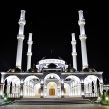
Competition for Russia’s Top Landmarks Alienates Chechens
Publication: Eurasia Daily Monitor Volume: 10 Issue: 156
By:

During the last two weeks of August, practically all the residents of Chechnya were busy voting for the republic’s main mosque, called the “Heart of Chechnya,” in the competition for Russia’s top ten landmarks (https://10russia.ru/rules). The contest was launched in March and will conclude at the end of September, when the ten top sites will be revealed.
The Russian Geographical Society together with the Rossiya TV channel organized the contest for Russia’s top ten landmarks. Few people heard about the competition during the period of March–June, but everything changed after the local branch of the Russian Geographical Society in Chechnya asked Chechen leader Ramzan Kadyrov to support their idea of organizing voting for the Heart of Chechnya mosque (https://www.mosoblpress.ru/43/140901/). The organizers of the contest realized perfectly well that Kadyrov’s participation would not be limited to just him personally, but would engage his entire administrative apparatus, as happened subsequently. Kadyrov addressed all residents of Chechnya from his Instagram account, asking them to vote for the Chechen mosque. Naturally, this was not a matter of voluntary participation. Kadyrov launched the campaign in a speech at a governmental meeting on August 13 (https://www.ridus.ru/news/103735/), after which all of the republic’s ministries and agencies started daily voting. The Heart of Chechnya mosque consistently led the competition, taking the first position from mid-August onwards. Muslims from all over Russia also participated in supporting Chechnya’s bid. Muftis from all the North Caucasian republics were invited to Chechnya, and they called on everyone to vote for Heart of Chechnya, standing against the backdrop of the mosque.
The Chechen authorities’ proactive approach to voting provoked a massive wave of anti-Chechen statements on the Internet (https://www.yaplakal.com/forum28/topic634256.html). The very idea that a mosque might become Russia’s symbol was killing Russian nationalists and patriotic youth (https://topwar.ru/32271-simvol-rossii.html). As a result, serious battles broke out on the Internet. The slogan “Anything but the mosque” became widely used among Russians (https://www.kurer-sreda.ru/2013/08/22/111923).
During the three weeks of voting in the second round that ended on August 30, thirty-eight million votes were cast for the mosque. Nevertheless, the mosque came in second behind Kolomensky Kremlin, in the Moscow Oblast city of Kolomna, which placed first by a small margin—400,000 votes. Few people had heard of Kolomensky Kremlin. The site that came in third lagged behind the top two choices by nearly 36 million votes, winning only 1.6 million votes.
The ratio of 38 million votes to the total Chechen population of 1.3 million residents is explained by the rules of the contest, which allowed people to vote multiple times via texting. Residents of Chechnya actively texted to promote the mosque. An acquaintance of this author admitted having submitted nearly 5,000 texts in support of the mosque over just two days. The individual was surprised to find out that in the second round a site needed to become one of 30 sites in order to advance to the third and final round. So nearly everyone in Chechnya sincerely thought that Chechnya should become first in the second round, but there was no actual need to win the second tour beyond securing one of the 30 top slots. The organizers of the competition received about $7 million just from the active texting by Chechens and Russian nationalists, who voted for Kolomensky Kremlin. In the third round, all the votes from the previous round were eliminated. So the scramble was essentially for satisfying one’s own vanity.
Kadyrov was disappointed with the results and accused everyone of playing against the mosque, including the phone companies, which allegedly stopped accepting votes for the mosque on the evening of August 29. So the head of Chechnya made a personal decision to remove the Heart of Chechnya from the contest (https://www.grozny-inform.ru/main.mhtml?Part=11&PubID=44967). Moreover, in the best tradition of the Soviet past, “indignant” young Chechens pelted the offices of the cell phone companies Megafon and Beeline with eggs. In Kadyrov’s opinion, the companies were guilty of throwing away one million votes cast for the mosque on the last night (https://mosday.ru/news/item.php?214135).
For safety reasons, cell operators were forced to shut down their offices throughout Chechnya and reopened only a day later (https://www.echomsk.spb.ru/news/kriminal/bilayn-i-megafon-vnov.html). At the same time, the State Duma deputies from Chechnya were ordered to ask the Investigative Committee to launch a criminal investigation of those forces that blocked votes cast for the mosque in Grozny (https://chechnyatoday.com/content/view/274690). Further, the incident pushed Kadyrov to call on Chechens to stop using the services of Megafon and Beeline from Moscow and start using the republican operator Vainakh Telekom (https://ria.ru/society/20130830/959766073.html).
Even that was not enough. The Chechen branch of the Russian Geographical Society announced it was disbanding itself to protest the “falsified” results of the Russia-10 competition (https://www.rosbalt.ru/federal/2013/08/31/1170431.html). But this resulted in an outcry in Moscow, with Russian presidential spokesman Dmitry Peskov stating that the regional branch’s decision to disband was undesirable (https://www.aif.ru/politics/news/440435). Peksov’s comments signaled there is a limit to Chechen indignation, beyond which sanctions might follow.
The competition itself had multiple issues, such as the promotion of sites that many Russian knew nothing about, the voting procedure that allowed multiple votes by the same person and so on (https://www.aif.ru/society/article/66100). The primary result of the competition is that Russia continues to regard Chechens as enemies. Deliberately or not, the competition pushed Chechens back to the 1990s, when they trusted Moscow less. The reaction of the Chechen officials who called on cell phone users in the republic to switch to Vainakh Telekom is notable. Adherence to national enterprises became the symbolic defensive gesture against Russian chauvinism and its rejection of Chechens. Thus, the Russian authorities themselves are setting the Chechens on a path toward national separatism. The competition proved to be an utter disaster for the Chechen pro-Russian patriotism that the Kremlin carefully cultivated in Chechnya for the past 13 years.




